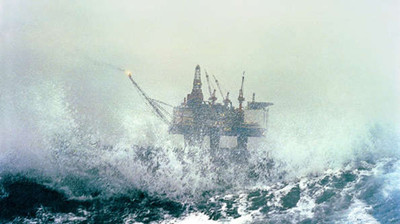油氣
The cruel sea
殘酷之海
The government tries to block a Russian investment in the North Sea
政府試圖阻止俄羅斯在北海投資
THE business climate in Britain's oil and gas industry is as daunting as the winter weather in the North Sea. Even before the oil-price fall last year, elderly fields were depleting fast and new finds were scarce. The regulatory regime favours the existing owners of platforms and pipelines and deters newcomers. Now the industry, which employs 450,000 people and pays almost 5 billion (7.7 billion) in taxes a year, faces the worst outlook in 40 years. Exploration has slowed sharply; job losses are rising.
英國油氣工業的商業環境正如北海的冬日氣候一樣令人生畏。即使是在去年油價下降之前,老油田的資源也在快速減少,新開發的油田又屈指可數。管理制度對現存油氣平臺和管道的業主予以厚待,卻使新來者望之卻步。如今這擁有450,000雇員、每年繳納近50億英鎊(77億美元)的行業面臨著40年來最糟的前景。油田探尋速度急速放緩,失業率正在上升。

So one might think that a wealthy foreign investor would be welcome. LetterOne, a Luxembourg-based investment fund run by Mikhail Fridman, a Russian tycoon, this week paid 5.1 billion (3.6 billion, 5.6 billion) to buy 12 oil- and gasfields belonging to RWE, an ailing German energy conglomerate, with the possibility of more investment to come. But the British government is trying to force Mr Fridman to sell the assets to a third party. Future sanctions imposed by America on Russia could, it fears, stop operations, entailing economic losses or safety risks.
因此人們也許認為富有的國外投資者將受到歡迎。俄羅斯大亨米哈伊爾·弗里德曼在盧森堡運營著一個名為LetterOne的投資基金會,該基金會本周出資51億歐元(36億英鎊,56億美元)來購買隸屬于RWE(一境況不佳的德國能源企業)的12個油氣田,并且未來可能還會投入更多資金。但英國政府正在試圖迫使弗里德曼先生將這些資產售賣給第三方。政府擔心美國未來對俄羅斯做出的制裁可能會中止運營、導致經濟損失或帶來安全風險。
The decision seems odd. Mr Fridman had instituted what someone close to the deal calls “belt and braces” safeguards to protect production in the event of new sanctions. For the first year, ownership reverts automatically to RWE. After that, a Dutch foundation takes over.
這個決定看起來莫名其妙。弗里德曼先生創立了被相關人士稱為”腰帶和背帶(雙重策略)“的保障措施,萬一受到了新的制裁,可以用來保護產品。第一年,所有權自動返回到了RWE那里。在那之后,被一個荷蘭基金會接管。
Moreover, Mr Fridman is hardly a Kremlin crony. This weekend he flew from London to Moscow to attend the funeral of Boris Nemtsov, the murdered opposition leader (the rest of Russia's business elite was mostly notable by its absence). Britain's biggest energy company, BP, has a controversial but so far lucrative partnership with Rosneft, the main Russian oil company, which is close to the Kremlin. The risk of that relationship going wrong should be a rather greater worry.
另外,弗里德曼先生很難被稱為是克林姆宮的密友。本周末,他從倫敦飛往莫斯科參加被謀殺的反對黨領導鮑里斯·涅姆佐夫的葬禮(值得注意的是其余俄羅斯商業精英的缺席)。英國最大的能源公司BP與Roseneft有著存在爭議但到目前為止還算有利可圖的合作關系,Roseneft是俄羅斯主要的油氣公司,與克林姆宮關系密切。這段合作關系變質的風險應該是更值得擔憂的問題。
Another oddity is that the man Mr Fridman has chosen to chair LetterOne's energy division, Lord (John) Browne, is a former boss of BP. He piloted the company through a bruising battle over strategy with its previous Russian partners, TNK, a firm in which Mr Fridman happened to be a leading shareholder. That tussle does not seem to have left lasting scars. Lord Browne's recent memoir describes Mr Fridman as “civil and charming”, “tough and hardworking”, a “superb negotiator” and “extremely focused”.
另一個古怪的地方是弗里德曼指定擔任LetterOne能源部門主席的人,(約翰)布朗勛爵,他是BP的前總裁。他曾帶領公司與前俄羅斯合作伙伴TNK就戰略方面的問題進行了一番爭斗,而弗里德曼正巧是TNK的主要股東之一。那場爭斗似乎沒有留下長久的疤痕。布朗勛爵最近的回憶錄是這樣描寫弗里德曼的:“文明且有魅力”、“堅韌且勤奮”,是一名“極好的談判者”,“極度專注”。
Mr Fridman threatened to go to court, calling the government's objections to the deal belated, hurried and irrational. On March 4th the energy minister, Ed Davey, backtracked, giving Mr Fridman a week to make his case.
弗里德曼威脅要訴諸法庭,號召政府反對這遲來、倉促且不理智的政策。3月4號,能源大臣愛德·達維松口給弗里德曼一個星期的時間來處理案件。
A bigger worry should be the future of the North Sea. Britain's regime, unlike Norway's, does not encourage oilmen to keep going in lean years. Statoil, the state-owned Norwegian company, has just invested 9 billion in the first phase of the new Johan Sverdrup field, which will by 2025 produce more than all Britain's wells. Collapsing confidence now could leave six billion barrels of oil stranded, says Sir Ian Wood, a veteran industry-watcher.
北海的未來才應該是更大的擔憂。英國海域與挪威不同,不鼓勵石油商在歉收年繼續開采。挪威國有企業Statoil剛對新的Johan Sverdrup油田第一階段開采投入了90億,這片油田到2025年將會產出比英國所有油田更多的資源。經驗豐富的產業觀察家伊恩·伍德閣下說,如今逐漸崩潰的信心可能讓60億桶原油開采擱淺。
True, some of the industry's woes are of its own making, such as grotesquely inflated wage costs (now shrinking fast) and complacency (punctured). But others are the result of haphazard policymaking (14 energy ministers in 17 years) and high, complex taxation, such as a supplementary levy introduced by George Osborne, the chancellor, in 2011. The marginal tax rate on some production is as much as 80%.
的確,該工業的某些災難是咎由自取,比如說荒唐膨脹的工資成本(如今正在快速縮水)還有它的自鳴得意(被深深刺痛)。但其他的災難就是顢頇決策(17年來換過14任能源大臣)以及高價、繁雜課稅的結果了,比如說,財政大臣喬治·奧斯本于2011年出臺的一項補充課稅。一些產品的邊際稅率竟高達80%。
The government is tweaking the tax regime, offering companies the chance to offset more losses against costs. It is offering to pay part of the multi-billion pound decommissioning bill. Perhaps it should be a bit nicer to foreigners wanting to risk their cash in the North Sea's bracing climate.
政府正在對稅制進行調整,給了公司通過減少支出來抵消更多損失的機會。它提出要部分支付數萬億英鎊的停工賬單。也許它應該對那些想在北海透心涼氣候中一擲千金的外國人友好一些。譯者:王穎 校對:邵夏沁












